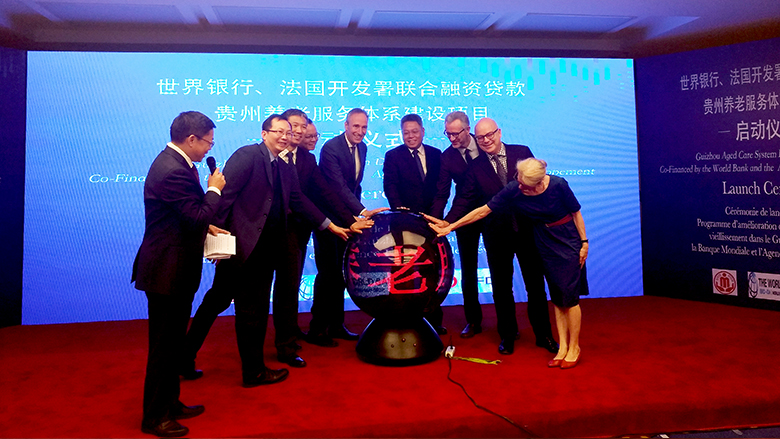BEIJING, June 6, 2019 – Yesterday the Government of China, the World Bank and Agence Française de Développement (AFD) officially launched the Guizhou Aged Care System Development Program-for-Results (PforR)[1] to increase coverage and quality of care services for the elderly and strengthen the efficiency of the aged care system in one of China’s poorest provinces.
China’s population is aging rapidly. People 65 years of age and older are expected to represent 26% of the population by 2050, up from 11.4 in 2017. In Guizhou Province today, more than 16% of its population are over 60 and 10% over 65.
Guizhou faces significant challenges in meeting the needs of its growing elderly population. These include low coverage of basic aged care services in rural and urban areas, lack of quality standards, shortage of skilled caregivers, and fragmentation of administrative, financing, and service delivery systems.
“This project will help Guizhou develop a standardized aged care system, leverage more private investment for the sector, improve management of existing facilities to provide services more effectively, and demonstrate institutional innovations in the implementation of the project. This has an important implication for accelerating the development of the aged care system in Guizhou,” said Wang Shijie, Vice Provincial Governor of Guizhou in his opening remarks.
Zhang Zhiqing, Deputy Director-General of the Foreign Capital Utilization Department of the National Development and Reform Commission noted the program represents “a shift from meeting financing and infrastructure needs to enhancing development strategy, planning, policies and institutions in China.”
“This program focuses its support on the development of an aged care system, innovative approaches to service delivery and training of care workers. It will set an example and play a leading role in the elderly care sector,” said Zhang.
Wang Zhongjing, Deputy Director-General of the Ministry of Finance’s International Cooperation Department, spoke about the new context for China’s cooperation with the World Bank. China’s focus on the quality of growth requires closer cooperation with the World Bank and other multilateral development institutions and learning from international experiences. Aged care is one of the six major areas for future cooperation. “We should increase the value added, innovativeness and demonstration effect of our projects, strengthen capacity building and deliver regional and global public goods,” he said.
“Guizhou is a typical province which gets old before it gets rich. Therefore, the program has special significance and will enable us to look for new approaches,” said Li Banghua from the Ministry of Civil Affairs. “The success of this project can allow China to share its experience with other developing countries, while supporting China in developing an aged care system with Chinese characteristics and assisting Guizhou to accelerate the development of the aged care sector.”
AFD has co-financed the program with a loan of EUR100 million. “We are very glad to be the co-financier of this project with a long-term loan and technical assistance in partnership with the World Bank,” said Yann Martres, AFD’s Regional Director. “France has been facing the challenge of an aging society for several decades. A comprehensive and structured policy of aged care services has been developed accordingly. We are delighted that French experience can be introduced to the project and shared with our partners,” he said.
Martin Raiser, World Bank Country Director for China, stressed the comprehensive nature of the aging issue. “Aging has implications for economic growth, labor markets, social insurance and social protection systems. It has implications for how people live together, how cities are built, how public transport needs to adjust, how medical system needs to adjust, and, most importantly, for families that face the need to care not just for children but for the elderly. This is a comprehensive challenge that requires a comprehensive response,” he said.
Raiser also highlighted a few “firsts”. This project is the first to use a PforR instrument for addressing the issues of aged care, not just in China, but in all countries where the World Bank operates. The project, for the first time, supports Guizhou to introduce a basic package of aged care services and the needs assessment system to define access to the basic package, establishes a contracting model for partnerships for service delivery, and pilots a case management model. “
The project also introduces a sector-wide budget reform to enhance budget management and applies new investment and operational guidelines. “We expect this project not just to help deliver better services, but to deliver them more efficiently and, by using disruptive technologies such as big data and cloud-computing, to contribute to a better service delivery model,” he said.
Raiser expressed thanks for the strong leadership and support from the central and Guizhou provincial governments. “We look forward to receiving continuous guidance and support from all of you during the implementation,” he said.
The launch was attended by senior officials and representatives from the central, provincial and local governments involved in the project, the World Bank and AFD.
-----------
[1] PforR is a lending instrument that uses a country’s own institutions and processes, and links disbursement of funds directly to the achievement of specific program results.


